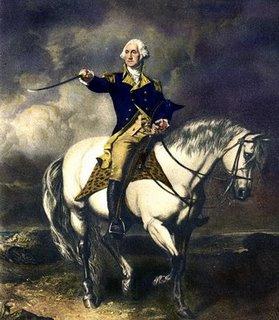Related Topics
Revolutionary Philadelphia's Patriots
All kinds of people were patriots in 1776, and many of them were all mixed up about what was going on and how they stood. Hotheads in the London Coffee House stirred up about an inoffensive Tea Act, Scotch-Irish come here to escape the British Crown, the local artisan class and the local smuggler class, unexpectedly prospering under non-importation, and the local gentry -- offended to be denied seats in Parliament like other Englishmen. Pennsylvania wavered until Ben Franklin stepped forward with a plan.
Causes of the American Revolution
Britain and its colonies had outgrown Eighteenth Century techniques of governance. Unfortunately, both England and America lacked the sophistication to make drastic changes smoothly.
Pacifist Pennsylvania, Invaded Many Times
Pennsylvania was founded as a pacifist utopia, and currently regards itself as protected by vast oceans. But Pennsylvania has been seriously invaded at least six times.
George Washington in Philadelphia
Philadelphia remains slightly miffed that Washington was so enthusiastic about moving the nation's capital next to his home on the Potomac. The fact remains that the era of Washington's eminence was Philadelphia's era; for thirty years Washington and Philadelphia dominated affairs.
Favorites - II
More favorites. Under construction.
George Washington's View of the British Army

|
| George Washington |
TWO things about George Washington continue to puzzle us. Why would the rich, aristocratic Virginia gentleman become a revolutionary? And, how could he or his backwoodsmen soldiers even imagine they could defeat the British, the greatest military force in the world? The following letter, written to his mother after the defeat of Braddock's army, shows his viewpoint at the age of 23, putting the British regular army in a very bad light, indeed.
"HONORED MADAM: As I doubt not but you have heard of our defeat, and, perhaps, had it represented in a worse light, if possible, than it deserves, I have taken this earliest opportunity to give you some account of the engagement as it happened, within ten miles of the French fort, on Wednesday the 9th instant.
"We marched to that place, without any considerable loss, having only now and then a straggler picked up by the French and scouting Indians. When we came there, we were attacked by a party of French and Indians, whose number, I am persuaded, did not exceed three hundred men; while ours consisted of about one thousand three hundred well-armed troops, chiefly regular soldiers, who were struck with such a panic that they behaved with more cowardice than it is possible to conceive. The officers behaved gallantly, in order to encourage their men, for which they suffered greatly, there being near sixty killed and wounded; a large proportion of the number we had.
"The Virginia troops showed a good deal of bravery and were nearly all killed; for I believe, out of three companies that were there, scarcely thirty men are left alive. Captain Peyrouny and all his officers down to a corporal were killed. Captain Polson had nearly as hard a fate, for only one of his was left. In short, the dastardly behavior of those they call regulars exposed all others, that were inclined to do their duty, to almost certain death; and, at last, in spite of all the efforts of the officers to the contrary, they ran, as sheep pursued by dogs, and it was impossible to rally them.
"The General was wounded, of which he died three days after. Sir Peter Halket was killed in the field, where died many other brave officers. I luckily escaped without a wound, though I had four bullets through my coat, and two horses shot under me. Captains Orme and Morris, two of the aids-de-camp, were wounded early in the engagement, which rendered the duty harder upon me, as I was the only person then left to distribute the General's orders, which I was scarcely able to do, as I was not half recovered from a violent illness, that had confined me to my bed and a wagon for above ten days. I am still in a weak and feeble condition, which induces me to halt here two or three days in the hope of recovering a little strength, to enable me to proceed homewards; from whence, I fear, I shall not be able to stir till toward September; so that I shall not have the pleasure of seeing you till then, unless it be in Fairfax... I am, honored Madam, your most dutiful son."
Originally published: Thursday, December 07, 2006; most-recently modified: Monday, May 20, 2019
| Posted by: John White | Feb 18, 2011 5:22 PM |